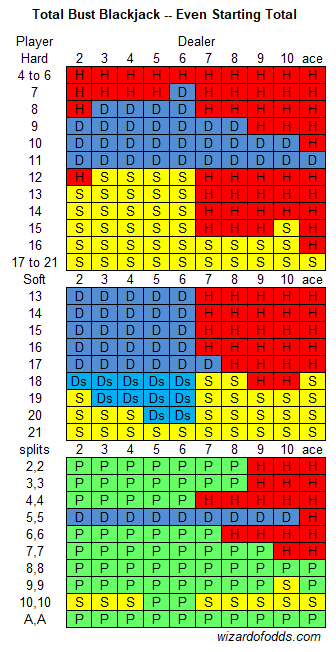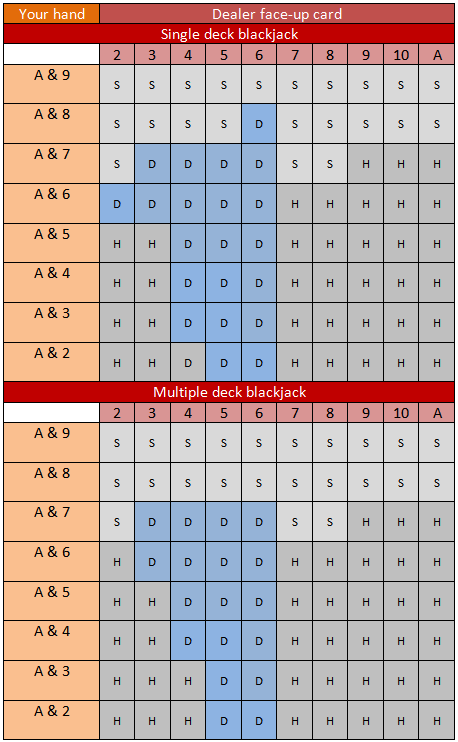When the dealer shows an ace and the player has a blackjack, the player can opt for even money and is paid immediately at 1:1. This is just a version of insurance, not a different bet. If the dealer has.
- Blackjack Simulator is always free — that’s the best. Sometimes you have no money to gamble — it is OK, you may play blackjack online just for fun, with no cash involved! Test some new strategy, have game experience and fun playing online blackjack. The virtual blackjack is also instantly available online for 24 7.
- 1.1 What Blackjack hands do we get? 1.2 What are the good Blackjack hands? 1.3 What hands get the money? 1.4 What hands do we get including dealer upcards? 1.5 What are the effects of common rules? 2.1 How often do we get each true count? 2.2 How valuable is each true count? 2.3 How do indexes affect advantages of counts?
- An ace with 10 or a face card is an unbeatable blackjack. Hard hand: The combined total of any two cards not containing an ace. Here are the possible hard hands: 9-7 (hard 16).
Blackjack Hands Switch
Unless you are a card counter, how other players play should not affect what you do. Basic strategy players should stick to the basic strategy no matter how badly the other players play. Other players are just as likely to help you as hurt you. In the end, it makes no difference how they play.


I think the reason for this is that they don’t want a minimum bet player hogging up two spaces. This will slow down the game and possibly prevent bigger bettors from playing. Not all land casinos have this rule, I think it is more prevalent in Atlantic City, where tables are more crowded, than Las Vegas. Whether online or a land casino there is no advantage to playing more than one hand.

As long as both players are agreeable then the casino is unlikely to stop you. In some situations it may not be practial because the player may want to take more than 3 cards. However with 10 against 4 the player should never take a fourth card, thus it was a good idea. Although a bit impractical you could always offer to buy the player’s hand and then you play it yourself, if you can agree on a price. My blackjack appendix 9 shows the fair value of all hands. As an example suppose another player had blackjack and the dealer had an ace up. Most players would take even money. You could make money by offering that player more than even money, but less than 103.8%, and then playing out the hand yourself. However don’t extend this offer to a card counter.
In ten years of running this site I steadfastly denied the myth that bad players cause other players to lose in blackjack. However, you are the lucky 1000th person to ask, so I took the trouble to prove it by random simulation. The rules I put in are the standard liberal Vegas Strip rules as follows.

6 decks
Dealer stands on soft 17
Double on any first two cards allowed
Double after split allowed
Late surrender allowed
Player may re-split to four hands, including aces
Cut card used
First, I had both players follow correct total-dependent basic strategy. Over almost 1.6 billion rounds, the loss of the first player to act was 0.289%, and the second player to act of 0.288%.
Second, I had the first player follow the same correct strategy, and the second player follow the same correct strategy except:
Blackjack Hands 21
Always hit 12 to 16
Always double 9 to 11
Split any pair
Never surrender
Never soft double
In a simulation of 1.05 billion hands the loss of the first player was 0.282%, and the second player was 11.260%. So the house edge of the basic strategy playing first player was almost the same, regardless of whether the second player played correctly or wildly incorrectly. I hope this puts and end the third baseman myth, but I doubt it. As I have said many times, the more ridiculous a belief is, the more tenaciously it tends to be held.
Blackjack Hands Strategy
I feel your pain. You can imagine how bad it gets in Spanish 21, which calls for such plays as hitting 14 against a 3. As long as it is just looks, I would let it slide. If it gets to words, I would say something like, 'There are lots of other tables in here.' There is no way you are going to convince simpletons like this by trying to explain the odds. The more ridiculous a belief is, the more tenaciously it tends to be held.
Blackjack Hands To Play
There is usually no sound-bite explanation anyway to why one play is better than another. To know why the correct play is what it is, one must either consider every possible way the remaining cards could fall, for both player and dealer, or play out the hand thousands of times, even millions for very borderline hands. The decision with the highest expected value is the one you should take. Only refusing insurance yields itself to being easily explained.